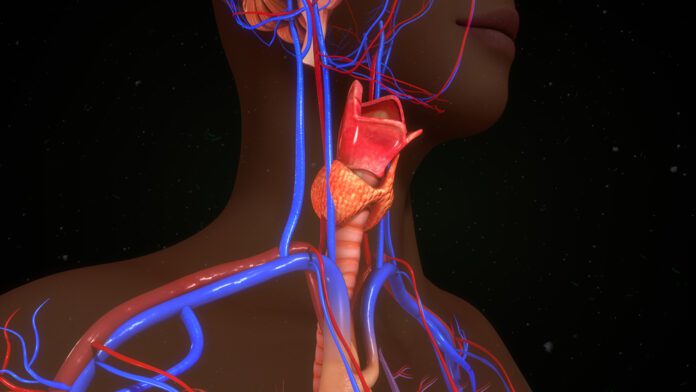Overview Of Hypothyroidism
Hypothyroidism is a condition in which the thyroid gland does not make enough thyroid hormone. This condition is often called underactive thyroid.
Commonly Associated With
Myxedema; Adult hypothyroidism; Underactive thyroid; Goiter – hypothyroidism; Thyroiditis – hypothyroidism; Thyroid hormone – hypothyroidism
Causes Of Hypothyroidism
The thyroid gland is an important organ of the endocrine system. It is located at the front of the neck, just above where your collarbones meet. The thyroid makes hormones that control the way every cell in the body uses energy. This process is called metabolism.
Hypothyroidism is more common in women and people over age 50.
The most common cause of hypothyroidism is thyroiditis. Swelling and inflammation damage the thyroid gland’s cells.
Causes of this problem include:
- The immune system attacking the thyroid gland
- Viral infections (common cold) or other respiratory infections
- Pregnancy (often called postpartum thyroiditis)
Other causes of hypothyroidism include:
- Certain medicines, such as lithium and amiodarone, and some types of chemotherapy
- Congenital (birth) defects
- Radiation treatments to the neck or brain to treat different cancers
- Radioactive iodine used to treat an overactive thyroid gland
- Surgical removal of part or all of the thyroid gland
- Sheehan syndrome, a condition that may occur in a woman who bleeds severely during pregnancy or childbirth and causes the destruction of the pituitary gland
- Pituitary tumor or pituitary surgery
Symptoms Of Hypothyroidism
Early symptoms:
- Hard stools or constipation
- Feeling cold (wearing a sweater when others are wearing a t-shirt)
- Fatigue or feeling slowed down
- Heavier and irregular menstrual periods
- Joint or muscle pain
- Paleness or dry skin
- Sadness or depression
- Thin, brittle hair or fingernails
- Weakness
- Weight gain
Late symptoms ofhypothyroidism, if untreated:
- Decreased taste and smell
- Hoarseness
- Puffy face, hands, and feet
- Slow speech
- Thickening of the skin
- Thinning of eyebrows
- Low body temperature
- Slow heart rate
Exams & Tests
The health care provider will do a physical exam and may find that your thyroid gland is enlarged. Sometimes, the gland is normal size or smaller than normal.
The exam may also reveal:
- Thin brittle hair
- Coarse features of the face
- Pale or dry skin, which may be cool to the touch
- Reflexes that are abnormal
- Swelling of the arms and legs
- Blood tests are also ordered to measure your thyroid hormones TSH and T4.
You may also have tests to check:
- Cholesterol levels
- Complete blood count (CBC)
- Liver enzymes
- Prolactin
- Sodium
- Cortisol
Treatment Of Hypothyroidism
Treatment is aimed at replacing the thyroid hormone you are lacking.
Levothyroxine is the most commonly used medicine:
- You will be prescribed the lowest dose possible that relieves your symptoms and brings your blood hormone levels back to normal.
- If you have heart disease or you are older, your doctor may start you on a very small dose.
- Most people with an underactive thyroid will need to take this medicine for life.
- When starting you on your medicine, your doctor may check your hormone levels every 2 to 3 months. After that, your thyroid hormone levels should be monitored at least once every year.
When you are taking thyroid medicine, be aware of the following:
- DO NOT stop taking the hypothyroidism medicine even when you feel better. Continue taking it exactly as your doctor prescribed.
- If you change brands of thyroid medicine, let your doctor know. Your levels may need to be checked.
- What you eat can change the way your body absorbs thyroid medicine. Talk with your doctor if you are eating a lot of soy products or are on a high-fiber diet.
- Thyroid medicine works best on an empty stomach and when taken 1 hour before any other medicines. Ask your doctor if you should take your medicine at bedtime. Taking it at bedtime may allow your body to absorb the medicine better than taking it in the daytime.
- Wait at least 4 hours after taking thyroid hormone before you take fiber supplements, calcium, iron, multivitamins, aluminum hydroxide antacids, colestipol, or medicines that bind bile acids.
While you are taking thyroid replacement therapy, tell your doctor if you have any symptoms that suggest your dose is too high, such as:
- Palpitations
- Rapid weight loss
- Restlessness or shakiness
- Sweating



